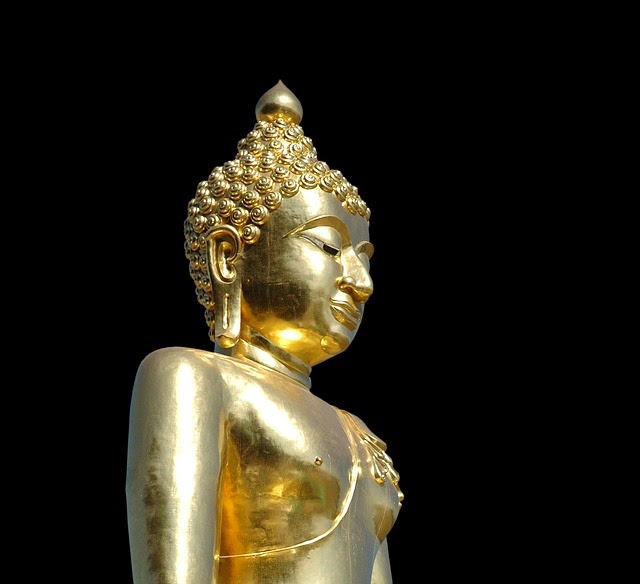CHAPTER TWENTY-FIVE.
THE MENDICANT.
To Find More Interesting Resources Click below :
|
Good is restraint of eye and ear, of nose and tongue,
Of body, speech and mind; restraint is good
In every way; the mendicant restrained
All sorrow casts away.
362.
In hand and foot and speech whoso is self restrained;
Whoso to ponder inwardly delights,
Who liveth lonely and is well-content,
Him men call mendicant.
363.
Whoso controls his lips, and words of wisdom speaks,
Is not puffed up, who can elucidate
The meaning and the essence of The Norm—
Pleasant is he to hear.
364.
Who dwelleth in the Norm and in the Norm delights,
Who searcheth out and well remembers it—
From the True Norm that steadfast mendicant
Will never fall away.
365.
Let him not think of little worth the alms he gains.
Nor jealous be of alms to others given;
For whoso envies other mendicants
Wins not tranquillity.
To Find More Interesting Resources Click below :
|
Though small the part of charity that falls to him,
Whoso despiseth not the alms he gains,
If he live clean, not given to slothfulness,
E'en by the gods is praised.[1]
367.
Whoso hath neither part nor lot in Name and Form[2]
(Who saith not "this is I" or "this is mine")
And grieveth not for what existeth not,
A mendicant is called.
368.
Whoso in friendly wise with all mankind abides,
Firm in the teaching of the Awakened One;
Reaches the bliss where all conditions cease,
Reaches the State of Peace.
369.
O mendicants! bail out the water from this boat![3]
Swift will it go when from this burden freed.
Of passion and of hatred cut the root;
Then shalt thou reach The Peace.
370.
Cut off the five; desert the five; the five subdue!
That mendicant, who from the fetters five[4]
Hath freed himself at last, by men is called
"A crosser of the Stream".
371.
O mendicant! be meditative; let not sloth,[5]
Let not thy passions toss thee to and fro;[6]
Lest, swallowing the ball, thou burning cry,
"Ah! this is suffering!"
372.
Who hath no wisdom cannot ecstasy attain;[7]
Who knows not ecstasy, no wisdom gains;
Whoso both ecstasy and wisdom hath,
Unto The Peace is nigh.
373.
The mendicant, whose mind hath gained tranquillity,
When he hath entered on his empty cell,[8]
Hath joy beyond man's power to tell, for he
The Truth discerneth well.
374.
Soon as he grasps the rise and fall of elements,[9]
Such pleasure and delight thereby he wins
As falls to them that rightly know the state
Of immortality.[10]
375.
Let the wise mendicant in this world thus begin;
Guard thou thy senses; next, with mind content,
By discipline restrained, seek noble friends
Who zealous live and pure;
376.
And by the laws of friendship act, live perfectly,
And upright walk according to the Norm;
Then in the fullness of thy joy thou shalt
An end of suffering make.
377.
O mendicants! just as the snow-white vassikâ,
The jasmine, putting forth fresh blooms to-day,
Sheds down the withered blooms of yesterday,
So shed ye lust and hate.
378.
Tranquil in body, speech and mind, O mendicants,
Whoso in every way is well-restrained,
Who all this world's desires hath thrown aside
He is "the tranquil" called.
379.
Rouse thou the self by self, by self examine self;
Thus guarded by the self, and with thy mind
Intent and watchful, thus, O mendicant,
Thou shall live happily.
380.
Yea! Self is guard of self and refuge takes in self;
Just as a dealer trains a thoroughbred,
A noble steed, and breaks him to the rein,
So do thou self restrain.
381.
That mendicant, with utter joy and gladness filled,
Firm in the teaching of the Awakened One,
Reaches the bliss where all conditions cease,
Reaches the State of Peace.
382.
Lo ye! a mendicant, though young he be, that strives
To grasp the teaching of the Awakened One,
Lights up the world, as from a cloud released
The moon lights up the night.
[1] Cf. vv. 229-30.
[2] Nāma rūpa, a traditional Vedic term for "mind and Matter," the immortal and the perishable, borrowed by the Buddha to stand for the mental and bodily compound in the individual, cf. Buddhist Psychology, Mrs. C.A. Rhys-Davids, pp. 23-5.
[3] The body with its needs and passions (water in the boat) hampers the progress across the stream.
[4]
I. The first five fetters of delusion of self, doubt, ceremonial observance, lust and ill-will.
II. The second five fetters of desire for form, desire for the formless, pride, vanity and ignorance.
III. If the verb of the third clause, vuttaribhāvaye, be translated "pay attention to," as is possible, the meaning will be, "develop the five good qualities of faith, zeal, concentration, meditation, wisdom."
IV. This may refer to the second five fetters, by throwing off which one becomes an Arahat.
[5] "Toss thee," reading kāmagunā bhamiṁsu (for kāmagune bhamassu) as Prof. Dines Andersen suggests (p. 192, Glossary to Dhammapada. Pt. 2).
[6] Cf. v. 107. One of the tortures in the hells.
[7] "ecstasy," jhāna. There are four stages of mystic meditation leading to rebirth in the higher worlds.
[8] "Empty cell," suññāgāram, may refer to the meditation in the "cave of the heart," when all thought vibrations are stilled, cf. v. 37.
[9] "The rise and fall," reading udayavyayam. cf. v. 113.
[10] 'immortality': viz.: 'the Ambrosial'.








No comments:
Post a Comment